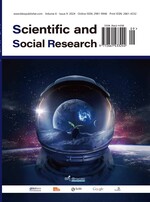Abstract
This paper investigates the integration of oral traditions with digital technologies in poetry education, proposing a comprehensive framework aimed at enhancing pedagogical effectiveness and cultural enrichment. Through a review of both historical and contemporary teaching methods, this paper emphasizes the distinct advantages of oral recitation in fostering deeper cognitive, emotional, and social engagement, which are qualities that digital tools frequently fail to replicate. Advocating for a balanced approach, the study leverages the sensory richness of oral traditions alongside the accessibility and innovation of digital platforms. The paper presents a pedagogical model rooted in experiential and multimodal learning theories to forge immersive, sensory-rich educational environments that preserve the depth of traditional oral poetry while harnessing modern technological advancements. The paper explores the implications of this hybrid approach for educational practices, cultural preservation, and policy, arguing that such integration not only enhances learning outcomes but also sustains cultural heritage within a digital educational framework. Additionally, it outlines future research directions to validate the framework’s efficacy, broaden its disciplinary applications, and evaluate its long-term educational impacts, contributing to a richer discourse on the harmonization of traditional methods and digital innovation in education.
References
Notopoulos JA, 1964, Studies in Early Greek Oral Poetry. Harvard Studies in Classical Philology, 1964(68): 1–77.
Izre’el S, 1992, The Study of Oral Poetry: Reflections of a Neophyte, in Mesopotamian Epic Literature: Oral or Aural? Edwin Mellen Press, New York.
Hoglund H, 2017, Video Poetry: Negotiating Literary Interpretations. Students’ Multimodal Designing in Response to Literature, thesis, Abo Akademi University Press.
Chen HR, Lin YS, 2016, An Examination of Digital Game-based Situated Learning Applied to Chinese Language Poetry Education. Technology, Pedagogy and Education, 25(2): 171–186.
Kempster JR, 2023, Digital Poetry for Adult English Learners with Limited Education: Possibilities in Language Learning, Literacy Development and Interculturality. TESOL in Context, 31(2): 115–132.
Smolskaya EP, Barteneva AS, 2021, Poetry and its Audience in the Digital Age. Concept Philosophy Religion Culture, 5(1): 157–168
Lewis-Fokum Y, Moore S, Spencer AT, 2021, Talk the Poem: Re-positioning Poetry Recitation as Transformative Pedagogy. Caribbean Journal of Education, 43(1): 85–108.
Finnegan R, 2018, Oral Poetry: Its Nature, Significance and Social Context. Wipf and Stock Publishers, Oregon.
Tsur R, 2017, Metre, Rhythm and Emotion in Poetry: A Cognitive Approach. Studia Metrica et Poetica, 4(1): 7–40.
Hamilton A, 2020, Rhythm and Movement: The Conceptual Interdependence of Music, Dance, and Poetry. Midwest Studies in Philosophy, 44(1): 161–182.
Naji J, 2021, What Is Digital Poetry, in Digital Poetry. Palgrave Macmillan, Cham
Kartini A, Sunendar D, Yulianeta Y, 2023, Analysis of Design Needs for Mobile Application Development Poetry Creation as a Learning Media for Writing Poetry. KEMBARA: Jurnal Keilmuan Bahasa, Sastra, dan Pengajarannya, 9(2): 351–362.
Selfa SM, Falguera GE, 2022, From Text on Paper to Digital Poetry: Creativity and Digital Literary Reading Practices in Initial Teacher Education. Frontiers in Psychology, 2022(13): 882–898.
Kendrick M, Early M, Michalovich A, et al., 2022, Digital Storytelling with Youth from Refugee Backgrounds: Possibilities for Language and Digital Literacy Learning. TESOL Quarterly, 56(3): 961–984.
Jusslin S, Hoglund H, 2021, Arts-based Responses to Teaching Poetry: A Literature Review of Dance and Visual Arts in Poetry Education. Literacy, 55(1): 39–51.
Hirsch S, Macleroy V, 2020, The Art of Belonging: Exploring the Effects on the English Classroom when Poetry Meets Multilingual Digital Storytelling. English in Education, 54(1): 41–57.
Moneva JCO, Cuizon AJP, 2020, Confidence: Before and After Oral Recitations. Journal of Applied Linguistics and Literature, 5(1): 94–101.
Wu S, Wong IA, Lin ZC, 2021, Understanding the Role of Atmospheric Cues of Travel Apps: A Synthesis between Media Richness and Stimulus–Organism–Response Theory. Journal of Hospitality and Tourism Management, 2021(49): 226–234.
Bailey JM, 2009, Reading Poetry for Improved Adolescent Oral Fluency, Comprehension, and Self-perception, thesis, Wichita State University.
Morrisson MS, 1996, Performing the Pure Voice: Elocution, Verse Recitation, and Modernist Poetry in Prewar London. Modernism/Modernity, 3(3): 25–50.
